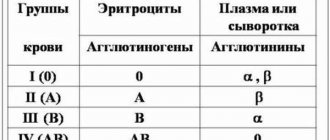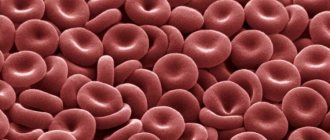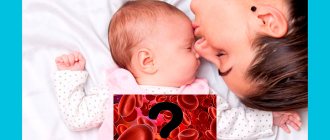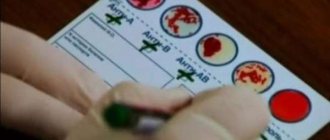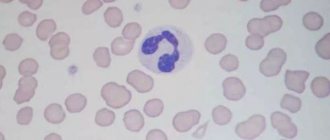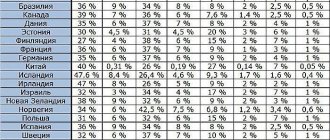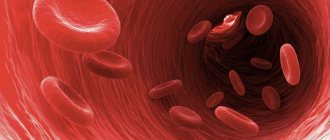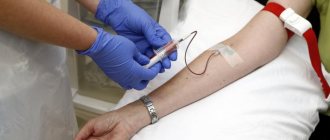Variants of group affiliation in children according to parents’ indicators
What group will the child have?
Many parents are sincerely surprised why they had a baby with different indicators from mom and dad. Such situations are not at all uncommon and they are completely incomprehensible to people far from genetics. Ignorance of the laws of genetic inheritance gives rise to various doubts in the minds of particularly jealous people. Genetics say that a child does not always inherit the group affiliation of one of the parents, and there are cases when the baby cannot be born with the blood parameters of the mother or father. The rules of inheritance are:
| Parents | Children |
| Both in the couple have blood type 0 | The child will inherit this group, there are no other options. |
| Both have AII in pair | A child may be born with the first or second group. |
| One has 0 in a pair, the other has 2 | The child inherits the indicator of one of the parents. |
| Both are paired with B | The child can acquire the first or third group. |
| One has a pair of B, the other has 0 | The child inherits indicators from one of the parents. |
| Paired A and B | A child can be born with any of four indicators. |
| Paired A and AB | The child may have 2, 3 and 4. |
| In a pair of B and AB groups | In a child, 2, 3 and 4 are possible. |
| In a pair 0 group and AB | A child can only be born with 3 and 2. |
The Rh factor is transmitted from one of the parents. A blood test for group and rh is carried out in the maternity hospital at birth. Each of us should know this data in order to report it to doctors in emergency cases. Women also need to know these indicators; if their rh is negative, it must be taken into account when planning a family. In general, today family planning specialists advise all couples to get their blood tested before conception.
Advantages
A person who is first negative, due to the lack of antigenic properties, is considered the safest donor for blood transfusion. In the absence of the same group, in life-threatening situations, it can be transfused to people with any other blood, regardless of the presence or absence of the Rh factor.
Such transfusions are routinely prohibited.
According to some theories, the owners of this group are very strong-willed people who always strive to be leaders. They actually achieve their goal. The characteristic features are: increased emotionality, a developed sense of self-preservation. Such a person will not risk his health and calculates the result of his actions in advance.
Perhaps such a transfusion is indicated in this case
Daily regime
To avoid health problems, people of blood type 1 need to adhere to a lifestyle that suits them. Most often, women suffer from unorganized nutrition and work rhythm. Doctors prescribe:
- do not eat a lot at one time: it is better to divide the portion into 2 times;
- do not eat food at night;
- limit fatty foods in your diet;
- expose yourself to light physical activity at least twice a week.
In general, these rules apply to all people who strive to lead a healthy lifestyle. But for carriers of blood type 1, this is especially true, since they are prone to obesity.
The preferences and characteristics of these people:
- love meat products;
- have a strong digestive tract; but if the measure is not observed, poor nutrition combined with a predisposition to increased acidity of gastric juice can lead to gastrointestinal diseases;
- strong immunity, thanks to which such people get sick less;
- do not tolerate changes in diet, climate, or living conditions;
- require attention to their own menu.
Diet tips
In the last century, the theory of the dependence of nutrition on blood type was very popular. The Rh factor was not taken into account at all. It was believed that there were certain foods that were most important for a person with each blood type. They also pointed out unhealthy foods that pollute the body and contribute to the occurrence of diseases.

Here's someone who only ate meat
The origin of all people with the first group is genetically related to the first anthropoid individuals that did not have antigens in the blood. They hunted and ate only meat. Due to drastic environmental changes, it is impossible for today’s “hunters” to consume meat alone; they will also need other healthy products.
The diet was proposed to be followed throughout life. Although the theory has long been refuted by long-term research, it still has followers. Therefore, we present everything that concerns the first blood group.
What is possible
People with this trait are considered obese. A balanced diet requires limiting sweets and flour products.
- Dishes made from lean beef or lamb, fish, and seafood are shown.
- Porridge should be prepared only from whole grains (buckwheat is the most useful).
- You should give preference to dishes made from pumpkin, broccoli, spinach, seaweed with onions, and parsley.
- You can drink green tea, herbal teas, rosehip decoction.
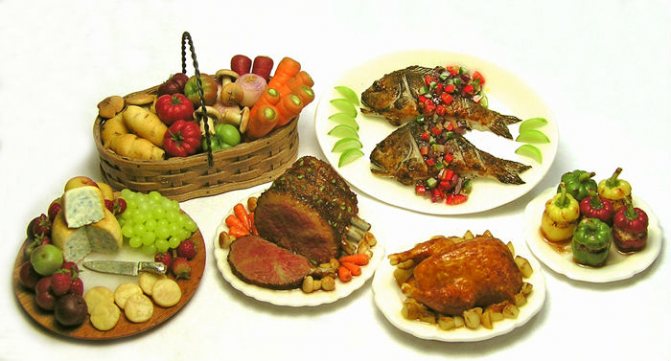
Conventional recommendations will have to be taken critically
What not to do
It is not recommended to combine milk and meat dishes, especially pork, in a daily diet.
- Sausage, smoked meats, and fatty meats are prohibited.
- Dairy products and eggs.
- It is proposed to give up sour fruits and berries, olives, citrus fruits, oranges, tangerines, and strawberries.
- Oatmeal and semolina are limited.
- Butter, hard cheeses, ice cream, ketchup, and mayonnaise are considered contraindicated.
- Potatoes, legumes, cabbage.
- Black tea, coffee, orange juice, kefir and milk.
The theoretical foundations of nutrition based on blood type provide for a gradual transition to a strict diet and allow temporary relaxations. Some consider this approach the only rational way to lose weight or maintain weight and health.
Modern medicine does not approve of excesses in nutrition, but is also against strict vegetarianism. Food must contain all the necessary components, otherwise it will take a long time to restore the imbalance with medications.
The best one is universal
Group 0 (first) blood is called universal because it is believed that it can be transfused to everyone. The fact is that it does not have antigens A and B on red blood cells, which means that the recipient’s body will not begin to produce antibodies against them. Thus, the first group can be considered the best, since its carrier can save any person in case of blood loss.
On the other hand, AB can be transfused only to owners of the same one, and to no one else. At the same time, anyone can become a donor for a person with IV, since AB blood plasma does not contain antibodies to antigens A and B.
You should know that such compatibility exists only theoretically. In modern conditions, it is forbidden to transfuse another group and with a different rhesus. The donor and recipient must have the same blood in both respects. An exception to the rules can be made only in case of urgent need.
Flaws
As for the shortcomings, there are many more of them. It should be noted that if the first negative group is universal, that is, it can be transfused to all people, then a person born with it can only be infused with the first negative and no more. Otherwise, it will lead to an immune response, and in extreme cases, even death.
Other disadvantages include:
- Tendency to acute respiratory viral diseases.
- Tendency to diseases of the gastrointestinal tract.
- The risk of hypertensive crisis in men increases.
- Increased likelihood of developing allergic reactions.
- Tendency to be overweight.
In addition, according to statistics, cases of hemophilia in men occur most often if they have the first negative blood group.
First negative blood group and its characteristics
The first blood group with a negative Rh factor exists in approximately 15% of people of the European race. About 7% of Africans have these characteristics. In India, negative blood group 1 is almost never found. Thus, its uniqueness directly depends on the climatic conditions of certain continents. For example, in Europe, the fourth negative blood group is rarer.
How is blood type 1 negative obtained?
What is the probability of a child having type 1 blood? It is formed in the fetus in the following cases:
- if it is present in both parents (100% probability);
- when the father or mother has it, and the other parent has a second or third.
Rhesus acts as an additional erythrocyte antigen. It is formed with the following probability:
- the newborn does not have it if the parents do not have it;
- if the mother or father has it, the child has a 50% chance of getting Rh negative.
Flaws
Typical diseases and symptoms from this group include:
- hypertension;
- stomach ulcer;
- being overweight;
- hemophilia in men;
- damage to the respiratory system;
- allergies.
Pregnancy problems
It is worth noting that the first pregnancy is considered the most favorable, since the woman’s immune system rejects the fetus in the last term. As a result, the child exhibits signs of jaundice, anemia, and impaired liver function. If you take the baby’s condition under medical control and carry out appropriate treatment, he can become completely healthy with age.
Recommendations in the field of dietetics
The origin of people who have the first blood group is genetically associated with the appearance of anthropoid individuals who eat exclusively meat food obtained by hunting. As a result of drastic changes that have occurred in the environment, people need other products besides meat. This allows you to ensure the normal functioning of the entire body, receiving the required amount of nutrients of various categories.
Thus, modern nutritionists have developed special nutrition that people of certain categories need to follow. Since the topic of the article is the first blood group, we will now talk about it.
What is recommended to eat?
It should be noted that people of this type are prone to obesity. Therefore, they need to create a diet that includes restrictions on sweet and flour products. Therefore, it is recommended to eat the following foods:
- dishes from fish, beef or low-fat lamb, seafood;
- porridges made from whole grains;
- broccoli, pumpkin, parsley, onion;
- green tea, herbal infusions.
What is not recommended to eat?
Thus, the blood of different groups affects not only personal qualities, his health, but also diet
This is worth paying attention to to maintain your health.
–2018 – Everything you wanted to know about blood
Copying and quoting site materials is permitted only if a clearly visible, direct link to the source is placed, open for indexing.
Diet
As mentioned above, people with the first negative blood group are susceptible to obesity. And that is why they need to pay close attention to nutrition. Recommended to eat:
- Lean meats, namely beef, fish.
- Porridge, since there is practically no fat in them (especially if they are boiled in water).
- Vegetables because they contain fiber and no fat. And they are absorbed much better.
In addition, it is recommended to drink green tea and rosehip decoctions.
As for prohibited foods, it is necessary to minimize the consumption of sweets and starchy foods, since they contain a lot of calories, and they also contribute to the formation of cholesterol plaques that interfere with normal blood circulation.
The first negative blood group is considered rare. And therefore, people who own it need to carefully monitor their health, since there are few donors and the environmental situation is getting worse.
Why is negative blood type 1 dangerous in men?
What problems might arise?
If this procedure occurs, a conflict occurs in the body due to the incompatibility of the Rhesus group of the first group, and the patient’s condition worsens significantly. According to scientists, about 15% of men live on the planet with a negative first blood group. To save a person, it is not always possible to select an appropriate donor with a negative Rh factor. Then doctors take risks by transfusing blood with the opposite Rh. This scenario is possible when there is no other way to save a life.
About strengths and weaknesses
They have the most widespread peptic ulcers of the stomach and duodenum. Blood type 1 #8212; This is a high risk of developing hypertension (high blood pressure). There are also a number of diseases that, due to the composition of certain substances, are not spared by carriers of such blood with a negative Rh factor. Blood type 1 provokes the appearance of hemophilia. Men with this group are more likely to suffer from kidney stones. According to doctors, blood type 1 #8212; the main factor that maximizes the risk of the appearance and development of this disease. This is confirmed by statistical data.
Carriers of such blood with a negative Rh factor have a high predisposition to diseases such as tuberculosis, asthma and bronchitis, accompanied by allergic manifestations, to allergic conditions caused by pathologies in the functioning of the bronchi.
Disease Prevention
Such men should definitely limit their consumption of flour, sweets and meat. High-calorie foods in excessive quantities provoke various diseases.
A special liquid or a “river of human life”?
When conceiving a child, blood type is not important. The main factor here is Rh. If a woman and a man have the same Rh factor, then no problems arise in the future. Rhesus conflict #8212 is dangerous; a situation where the Rhesus of a woman and a man does not match. In such cases, the child may develop Rhesus jaundice, which is very dangerous. In addition to the Rh conflict, an AB-zero conflict may also arise, or both conflicts may appear simultaneously. Medicine is constantly evolving, and now there are procedures that can prevent possible complications associated with these conflicts before pregnancy.
Experts consider the first group with negative Rhesus a phenomenon, the solution to which will help the treatment of many male diseases.
Share it with your friends and they will definitely share something interesting and useful with you! It's very easy and fast, just click the button for the service you use most often:
How does the Rh factor of parents affect the child?
It is known that if a woman has a Rh factor of “-” and a man has a Rh factor of “+,” then a serological conflict arises.
How does the Rh factor affect the unborn child?
Serological conflict is a disorder primarily affecting women with the Rh- blood type who have children with an Rh+ male. This phenomenon causes hemolytic disease of the fetus or newborn. The essence of the problem lies in the mother's production of antibodies that destroy the fetus's red blood cells. This leads to anemia and many other serious complications.
It should be noted that a serological conflict rarely occurs during the first pregnancy, since the mother's immune system does not yet produce antibodies to the Rh factor.
Rh conflict during pregnancy appears no earlier than 16 weeks after conception. If antibodies are not detected by 20 weeks of pregnancy, they are unlikely to appear.
Rhesus - conflict resembles a mechanism of defense against viruses, when resistance is formed by the immune system to destroy the “enemy”. While in the case of pathogenic microorganisms the phenomenon has a beneficial effect, in the case of a serological conflict the effect is completely opposite, since it causes pathological conditions in the child.
As a result of inheritance, the fetus receives antigenic characteristics from both the mother and the father. During pregnancy, due to the penetration of fetal blood cells into the mother's blood circulation with the antigenic characteristics of the father (which the mother does not have), the mother begins to produce antibodies directed against these antigens.
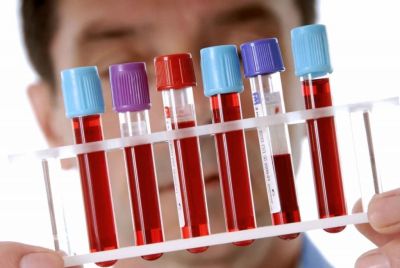
The most famous and important example of serological conflict is the difference in Rh cell antigens in the fetus and mother. The formation of antibodies in a woman's circulation occurs when the fetus inherits the father's "D" (Rh+) antigen and the mother has the "d" (Rh–) antigen.
The resulting antibodies to the Rh factor enter the baby's circulation and cause damage to blood cells, leading to hemolytic disease.
The mildest form of hemolytic disease is the destruction of a child's blood cells. The child is born with anemia, which is usually accompanied by an enlarged spleen and liver, but this does not pose a threat to his life. Over time, the blood picture improves significantly and the child develops correctly. However, it should be emphasized that in some cases anemia is severe and requires special treatment.
Neonatal jaundice is another form of hemolytic disease. The baby looks quite healthy, but on the first day after birth, a jaundiced color of the skin begins to appear. There is a very rapid increase in bilirubin, which has a toxic effect on the child’s brain and liver.
The final and most serious form of hemolytic disease of the newborn is generalized fetal edema. As a result of the destruction of the baby's blood cells by the mother's antibodies (still at the stage of intrauterine life), blood circulation is disrupted and vascular permeability increases. What does it mean? Fluid from the blood vessels leaks into nearby tissues, causing internal swelling to form in important organs, such as the peritoneum or the pericardial sac that surrounds the heart. Unfortunately, edema is such a serious pathological condition that it usually leads to the death of the child in the womb or immediately after birth.
Mental and physical characteristics
Since since ancient times the carriers of the first group were hunters and warriors, they had to survive in difficult conditions. This strengthened their character.
It is believed that representatives of group 1 are strong, purposeful optimists who succeed in business. They show persistence and try to achieve their goals. However, things started are rarely completed.
Among these people there are many bankers, organizers, politicians, and executives. They know what they want and persistently pursue the goal. At the same time, group 1 also developed negative character traits.

In an effort to achieve what they want, representatives of blood group 1 become excessively cruel. They are jealous, ambitious and cannot stand criticism. It is difficult for such people to communicate on an equal basis with others: they try to get ahead, sometimes irritating others with excessive persistence.
The characteristics of the blood also determine a number of diseases to which people of this type are susceptible. Since they historically have a predilection for meat foods, vitamin deficiencies arise due to limited consumption of vegetables and fruits.
A monotonous diet leads to diseases of the gastrointestinal tract, including ulcers and colitis. Due to an increased susceptibility to inflammatory processes, arthritis often develops.
Representatives of group 1 suffer from poor blood clotting, which can provoke bleeding. Such people should avoid wounds and damage to the skin and internal organs.
Digestive problems lead to frequent allergic reactions, and the immune system and thyroid gland suffer. In children, pustular inflammation of the skin is not uncommon.
What are the consequences for mother and child?
For a pregnant woman, the development of a serological conflict does not threaten her in any way and does not affect her health in any way, which cannot be said about a child. A serological conflict can cause severe hemolytic disease (erythroblastosis fetalis), brain damage, hypoxia, and damage the central nervous system, liver and kidneys. For this reason, such a pregnancy requires careful medical monitoring.
Does blood group compatibility affect conception and gender of a child?
When planning a child, parents need to know their own blood type and Rh factor. This is important information that can affect both the course of pregnancy and the health of the unborn child.
Is blood group and Rh factor compatibility so important? The blood type itself (if you do not take into account the Rh factor) does not in any way affect the process of conception, the course of pregnancy or the gender of the child. In the practice of any reproductive specialist, there is more than one case where parents with different blood groups became parents of a healthy child.
Ideally, the Rh factor of both parents should match, otherwise there is a high risk of developing a serological conflict, when the mother’s body rejects the fetus as a foreign body.
Peculiarities
According to scientists, based on a person’s blood parameters, one can determine his predispositions and characteristics. Blood group 1 is considered the most ancient. Its owners were hunters and warriors. Ancient people were hardy, and their bodies fought well against various diseases. Scientists tend to explain these facts by the absence of antigens on the surface of red blood cells and their content in plasma.
It’s interesting, but doctors still only find it among the indigenous people of America. This is explained by the fact that Indians do not welcome mixed marriages, which means that blood is inherited without impurities.
The most common health problems they have are:
- Pathologies of the endocrine system.
- Poor blood clotting.
- Allergies.
- Ulcer.
- Pathologies of the respiratory system.
- Joint diseases.
What is the Rh factor?
Rh factor (Rh factor) is a blood protein that is found on the surface of blood cells - red blood cells.
If this protein is present, then this means that the person has a positive Rh factor, but if it is not there, then it is negative. Rh factor is determined by antigen. There are five main antigens, but it is the D antigen that indicates Rh. 85% of the world's population have positive Rh factors. How to determine your Rh factor? It is enough to donate blood from a vein just once. This indicator does not change throughout life. The Rhesus status of the embryo is formed already in the first trimester of pregnancy. Determining this indicator is very important for the expectant mother, since in the case of an Rh-negative mother and an Rh-positive child, various pregnancy complications are possible. In this case, it will be especially important to follow the doctor’s instructions, avoid infectious and colds, as well as stress. Also on various websites there are so-called calculators that determine the Rh factor of the unborn child. It must be remembered that blood is donated on an empty stomach. A rapid Rh test can be taken at any independent laboratory where blood is taken (for example, Invitro). The price depends on the price list of the clinic itself. You can find out about the cost of the analysis immediately before delivery. You can also donate blood and find out your Rh factor for free if you become a donor. To do this, you need to fill out a form to register yourself as a blood donor at the appropriate institution.
The Rh factor also plays a big role in blood transfusions. A transfusion involves two people: the recipient (the one who receives the blood) and the donor (the one who donates the blood). If the blood is incompatible, the recipient may experience complications after the transfusion.
The most common myth among couples is that blood type (like the Rh factor) is inherited from a man. In fact, the inheritance of the Rh factor by a child is a rather complex and unpredictable process, and it cannot change during life. But it is worth remembering that in rare cases (about 1% of Europeans) a special type of Rh factor is determined - weakly positive. In this case, Rh is determined either positive or negative. This is where questions arise on forums: “why did my Rh minus change to plus?”, and legends also appear that this indicator may change. The sensitivity of the testing method plays an important role here.
An equally popular search on the Internet is “horoscope by blood type.” For example, in Japan, great attention is paid to deciphering blood type. Believe it or not - it's up to you.
In the world there is such a thing as a medical tattoo, photos of which can be easily found on the Internet. What do these tattoos mean and what are they for? Its designation is quite pragmatic - in case of a serious injury, when an urgent blood transfusion or surgery is required, and the victim is not able to give the doctor information about his blood type and Rh. Moreover, such tattoos (a simple application of the blood type and Rh factor) should be in places accessible to the doctor - shoulders, chest, arms.
Pregnancy
Group affiliation for the course of pregnancy does not play a special role, but the absence of the Rh antigen can create a lot of serious problems. The only exception is when both the expectant mother and the expectant father are Rh negative, and she has not previously had births or abortions from a Rh positive man, that is, if Rh antibodies have not formed in her blood.
But this does not mean that the unborn child also has negative Rh, because it is inherited according to the laws of genetics 1:1, that is, in 50% of cases. This protein, penetrating into the mother’s body through the placenta, contributes to the gradual production of anti-Rh antibodies. Antibodies necessarily interact with the antigen and Rh conflict occurs.
A planned pregnancy is a serious step. In preparation for procreation, spouses must undergo a short examination, as a result of which serious chromosomal abnormalities can be identified.
What is the characteristic of 1 negative blood group - quite rare among people around the globe. It will be interesting to know the characteristics of its owners. What kind of character do they have, what health problems may arise.
What blood type is most rare?

There are four types of blood, as well as two subtypes, which differ depending on the Rh factor. Approximately 87% of people around the world are Rh positive and only 13% are Rh negative. According to statistics, the first negative is considered quite rare, since it occurs in only 4% of people worldwide. However, the most unique group is considered to be the fourth, about 5-6%, with Rh negative within 1% throughout the globe.
Interesting! Although this blood type is found in people more often than some others, it is popularly called blue blood.
Rh positive during pregnancy
If you are Rh positive, then your husband’s Rh negative will not affect the course of your pregnancy. In the case when a child inherits a negative Rh factor, there is no protein in his blood that is “unfamiliar” to the mother’s immune system, and a conflict will not arise.
- Rh-positive mother + Rh-positive father = Rh-positive fetus
The child has inherited the positive Rh factor of the parents, and the pregnancy will pass without complications. - Rh-positive mother + Rh-positive father = Rh-negative fetus
Even if the parents' Rh factor is positive, the baby can be negative. In this case, we can still talk about the compatibility of Rh factors during pregnancy: the mother’s body is “familiar” with all the proteins in the child’s blood. - Rh-positive mother + Rh-negative father = Rh-positive fetus
Both the mother and the fetus are positive, and there is no conflict during pregnancy. - Rh-positive mother + Rh-negative father = Rh-negative fetus
Although mother and fetus have different Rh blood factors (mother and child have positive and negative, respectively), there is no conflict.
As already mentioned, Rh blood is a protein. And since the mother’s body already has this protein, the fetal blood does not contain components unfamiliar to the mother’s immune system.
Rh negative during pregnancy
There is a vaccine - anti-Rhesus immunoglobulin, which prevents Rh-conflict during pregnancy. It binds the antibodies that the mother’s body produces and brings them out. Vaccination can be carried out during pregnancy. If you are Rh negative and your husband is positive, this is not a reason to give up motherhood. Over the course of 40 weeks, you will have to donate blood from a vein several times:
- up to 32 weeks - once a month;
- from the 32nd to the 35th week - 2 times a month;
- from the 35th to the 40th week - once a week.
If Rh antibodies appear in your blood, your doctor can detect the onset of a Rh conflict in time. In case of conflict pregnancy, immediately after birth, the newborn is given a blood transfusion: the group and Rh factor must be the same as that of the mother. This is especially important in the first 36 hours of the baby’s life - the mother’s antibodies that enter the child’s body are neutralized when they “meet” familiar blood.
How do your chances of conceiving depend on your blood type?
Quite a lot is already known about the influence of blood groups, for example, on the likelihood of developing Alzheimer's disease, cancer, blood clots, etc. However, virtually nothing was known about the effect on fertility. And finally, thanks to the efforts of Turkish doctors, research has appeared in this area.
A study published last week found that men with type O are four times less likely to develop impotence compared to guys with other blood types. Experts from Ordu University in Turkey noted that blood type is as important a risk factor as smoking, excess weight, and high blood pressure. The reason is not clear, but scientists have said that in people with type A blood, the penis has a large number of veins, the lining of which can become damaged, leading to erectile dysfunction.
Blood type also affects female fertility. Girls with the second group are more likely to bear a healthy child for a long time than with the first. Studies have shown that women in the first group quickly deplete their egg reserves early in life. But at the same time, women with type 0 have a lower risk of developing preeclampsia - high blood pressure during pregnancy, which can be dangerous for mother and baby.
Naturally, representatives of the rest of humanity (which, by the way, are a little more than half, because people of the 1st group account for a little more than 40%) should not panic either - a higher probability does not mean a 100% chance. Likewise, representatives of the “happy” group should not relax ahead of time - reduced risk does not mean zero.
Rh factor, blood group, blood protein, antibody production, anemia, immune reaction, Rh compatibility, anemia, hydrops, fetal edema, immunoglobulin
When does Rh-conflict pregnancy occur?
Rh negative mother + Rh positive father = Rh positive fetus
Please note: no matter what group the mother has, negative Rh during pregnancy becomes a cause of conflict. In this case, the embryo inherits it from the father and brings the “new protein” into the body of the Rh-negative mother. Her blood “does not recognize” this substance: there is no such protein in the body. Accordingly, the body begins to defend itself and produce antibodies. They penetrate the placenta into the baby's blood and attack his red blood cells. The fetus tries to defend itself: the spleen and liver begin to work hard, and they increase significantly in size. If a child has few red blood cells left, he develops anemia, or anemia.
Rh factor negative during pregnancy
Rh negative during pregnancy is not always a death sentence for the baby. The main thing is that it is the same for both the baby and the mother.
- Rh-negative mother + Rh-negative father = Rh-negative fetus
The baby inherited the Rh factor of his parents. And since both the mother and the fetus have no protein (Rhesus) in their blood and their blood is similar, then a conflict does not arise. - Rh-negative mother + Rh-positive father = Rh-negative fetus
This is one of the cases when the Rh factor is very important: the compatibility of the blood of the mother and the fetus affects the next nine months of intrauterine life. Although a woman is Rh negative during pregnancy, it is good that the fetus is also Rh negative. There is no Rh in either the mother's blood or the fetus's blood.
